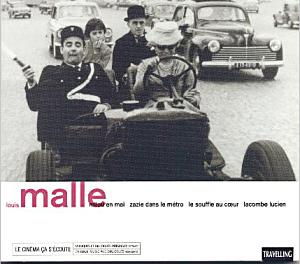Compilation:
Music for the films of Louis Malle: Stéphane Grapelli – Milou en mai; Fiorenzo Carpi – Zazie dans le metro; Charlie Parker and Sidney Bechet – Le souffle au coeur; Django Rheinhardt – Lacombe lucien
TRAVELLING NAÏVE K1612 [50:39]

As with the other CDs in this series, a good knowledge of the French language is advisable to fully appreciate the dialogue portions of this album. (Although the 2- language notes give an appreciation of the film and those with good memories of the films themselves because they are all celebrated will no doubt be reminded if they can appreciate odd snatches of the speech sections). Beyond that, the jazz from the celebrated musicians employed in three of the films can be enjoyed in its own right. There is jazz violinist Stéphane Grappelli's expressive, and frequently ironic, commentary on the action in Milou en mai (dealing with a family arguing about an inheritance against the background of the events of May 1968); the music that is sexy and slinky and fast and furious. The last excerpt from this score features piano modulating from elegant baroque to traditional jazz before the violin enters to bring the music to a snappy ending. In Le souffle au coeur, a sensitive study of incest, there is more traditional jazz from Charlie Parker and Sidney Bechet with a Gallic twist. Jazz guitar opens the score excerpts from Louis Malle's Lacombe lucien, a film about a youth who unwittingly becomes a Nazi collaborator. The music of Django Reinhardt is featured this time seasoned with some doleful woodwind solos.
Probably Malle's best-loved film is Zazie dans le metro a surreal movie about a ten-year old girl who comes to Paris to ride the Metro but is disappointed because the underground is closed due to a strike. Her consequential extraordinary adventures are underscored by Florenzo Carpi. Much of the music is a parody of other film score genres ranging from the tensely insistent drum-beat music associated with Hollywood and Spaghetti westerns to the sort of music Herrmann would have written for Hitchcock. Other music excerpts sound as if they were refugees from Tom and Jerry cartoon capers.
Ian Lace

Return to Index